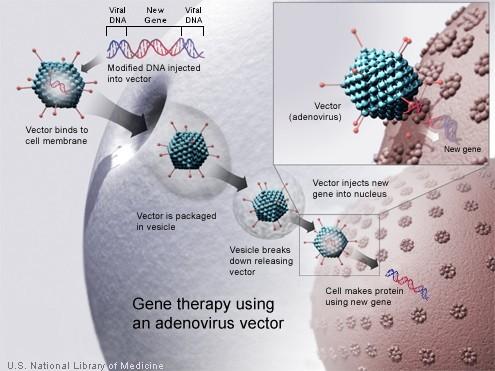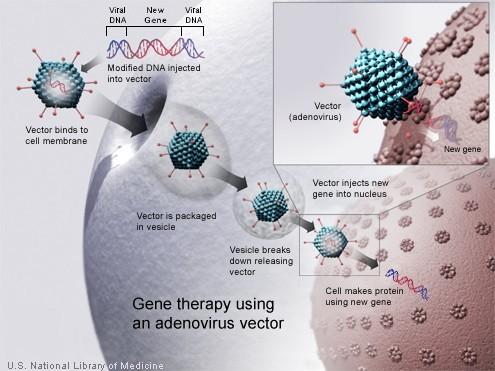
Credit: US National Library of Medicine
After three decades of hopes tempered by setbacks, gene therapy–the process of treating a disease by modifying a person's DNA–is no longer the future of medicine, but is part of the present-day clinical treatment toolkit. The Jan. 12 issue of the journal Science provides an in-depth and timely review of the key developments that have led to several successful gene therapy treatments for patients with serious medical conditions.
Co-authored by Cynthia E. Dunbar, M.D., senior investigator at the Hematology Branch of the National Heart, Lung and Blood Institute (NHLBI), part of the National Institutes of Health, the article also discusses emerging genome editing technologies. According to Dunbar and her colleagues, these methods, including the CRISPR/Cas9 approach, would provide ways to correct or alter an individual's genome with precision, which should translate into broader and more effective gene therapy approaches.
Gene therapy is designed to introduce genetic material into cells to compensate for or correct abnormal genes. If a mutated gene causes damage to or spurs the disappearance of a necessary protein, for example, gene therapy may be able to introduce a normal copy of the gene to restore the function of that protein.
The authors focused on the approaches that have delivered the best outcomes in gene therapy so far: 1) direct in vivo administration of viral vectors, or the use of viruses to deliver the therapeutic genes into human cells; and 2) the transfer of genetically engineered blood or bone marrow stem cells from a patient, modified in a lab, then injected back into the same patient.
Originally envisioned as a treatment solely for inherited disorders, gene therapy is now being applied to acquired conditions such as cancer. For example, the engineering of lymphocytes, white blood cells, that can be used in the targeted killing of cancer cells.
In 2017, a steady stream of encouraging clinical results showed progress in gene therapies for hemophilia, sickle-cell disease, blindness, several serious
inherited neurodegenerative disorders, an array of other genetic diseases, and multiple cancers of the bone marrow and lymph nodes.
Three gene therapies have been approved by the U.S. Food and Drug Administration in the past year, and many more are under active clinical investigation. The authors looked to the future of gene therapies, and the challenges of delivering these complex treatments to patients.
Much of this research has been funded by NIH, and key advances took place in the NIH Clinical Center.
###
WHO: Cynthia E. Dunbar, M.D., senior investigator, Hematology Branch, NHLBI, NIH, is available for comments.
ARTICLE: Dunbar et al., Gene therapy comes of age. Science 359, eaan4672 (2018)
CONTACT: For more information or to schedule an interview, please contact the NHLBI Office of Science Policy, Engagement, Education, and Communications at 301-496-5449 or [email protected]
Part of the National Institutes of Health, the National Heart, Lung, and Blood Institute (NHLBI) plans, conducts, and supports research related to the causes, prevention, diagnosis, and treatment of heart, blood vessel, lung, and blood diseases; and sleep disorders. The Institute also administers national health education campaigns on women and heart disease, healthy weight for children, and other topics. NHLBI press releases and other materials are available online at http://www.nhlbi.nih.gov.
About the National Institutes of Health (NIH): NIH, the nation's medical research agency, includes 27 Institutes and Centers and is a component of the U.S. Department of Health and Human Services. NIH is the primary federal agency conducting and supporting basic, clinical, and translational medical research, and is investigating the causes, treatments, and cures for both common and rare diseases. For more information about NIH and its programs, visit http://www.nih.gov.
NIH…Turning Discovery Into Health
Media Contact
NHLBI Engagement and Media Relations Branch
[email protected]
301-496-5449
http://www.nhlbi.nih.gov





